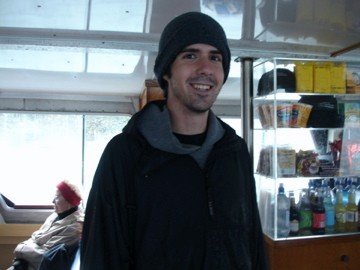
This entry is way, way overdue since I saw this exhibit over a month ago, but I made a note to write about it later and, dangnumit, I'm gonna write about it.
Though I'm not a real Losangelophile, I do have a crude sense of the city and The Getty certainly qualifies for the short list of my favorite places to go and show -- though perhaps more for the view and atmosphere than for the actual art ... more on this later*.
* That's right, a dash and ellipsis in the same sentence.
So, on this last trip there, I was particularly taken with the headlining exhibit, a large collection of Irving Penn photographs entitled "Small Trades." (Check it out here.) Now, what I really found striking about the show was how my perception of it as a whole evolved the more people/jobs/photos I saw.
That is, at first, the idea didn't seem all that exciting. It was a simple looking man holding a broom. Big deal. But then it was the street sweeper next to the milkman, and the milkman next to the busboy, and then the busboy next to the mechanic, and so on and so on. Soon, I felt very much connected to this collage of mid-century life. I felt like I almost understood how the identified cities (NY, London, Paris) functioned with all of these inhabitants working together to create a interchanging machine of industry, commerce, and just plain ol' livin'. It was, in some sense, a grand equation that revealed how society endures; all the variables and components were represented.
The people Penn chose seemed so apt too, their faces conveying such humanity. I could not help but imagine the lives of these people, those who possessed these small trades, who went to work such unglamorous jobs, every morning, day after day, year after year. Each snapshot was like its own window into an unwritten and unread novel, though some of these novels more engaging than others. The monotony of life, not as a condemnation but merely as a fact, was carefully expressed through these photographs.
Along with this, came the idea of definition, of being known through occupation. To themselves and maybe a few others, these workers were full, complete people, but to the viewer and to the other workers, they were, except in moments of reflection, only the longshoreman, or only the butcher. The exhibit does provide this necessary pause to examine the notion that we are all equally complete beings, living the same seconds and decades, but through its quantity it also mirrors the necessity of not giving everyone due time. Some must be forgotten. Some must be passed over. To consider the replete private lives of all these professionals is too overwhelming. It is literally beyond our ability to comprehend the magnitude of all these lives and this exhibit is, in some ways, as close as we can get.
On a lighter note, it was also just fun to see some of these bizarre professions. Some were entertaining in their specificity (I think watermelon man [or something like that] may have been one of them) or in their classicism (chimney sweep, for example). Had I been planning on writing about the show or taking notes (or not waited so long to recount the trip) I could've shared some of the best ones, but, alas, I fear you'll just have to imagine them.
It was both intellectually stimulating and emotionally moving. An excellent case of a simple subject matter (i.e. pictures of ordinary people) executed in such a way as to be significant. It has since left The Getty, unfortunately, but I believe there is a book that has most, if not all, of these photographs.
As for The Getty itself, as much as I love it, it's not the best place to actually go and experience art. While the Penn exhibit gained my full attention, the views of the city and beautiful architecture and gardens are almost too much to focus on anything else. The trip of The Getty is great, but the art is secondary, as opposed to, for example, LACMA, where the main course is the art. But maybe that's just my problem. Whatever balance one strikes at The Getty, it's not to be missed.

No comments:
Post a Comment